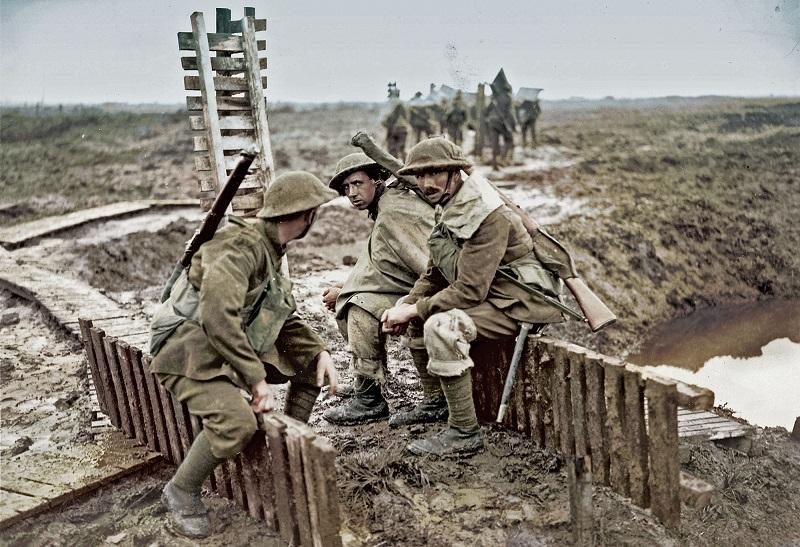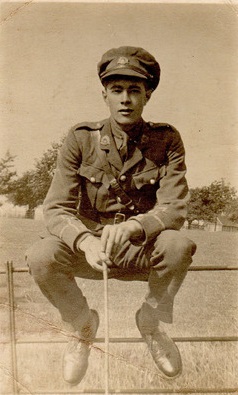I Was There, BBC Two | reviews, news & interviews
I Was There, BBC Two
I Was There, BBC Two
The Great War generation movingly depicted in its own words

We have already seen a lot of World War I on television this year, and clearly we’re going to be getting a great deal more before it's out. Whether it’s a “celebration” season, or the diametrical opposite, or just that looser term, commemoration, is something each individual viewer will have to decide for themselves.
 Much of it will be, to some extent, extrapolation, and little will reach the sheer, concentrated power of I Was There: The Great War Interviews. If you didn’t like Jeremy Paxman’s Britain’s Great War, in which that Newsnight timbre dominated, even belittled its subject – can we ever entirely avoid the associations of a voice and self-image when it’s so set in our consciousness? – then I Was There was the reverse. It went back to the oral testimonies of the survivors, and those connected to others who didn't survive, bringing us as close to the experience as we can surely ever come.
Much of it will be, to some extent, extrapolation, and little will reach the sheer, concentrated power of I Was There: The Great War Interviews. If you didn’t like Jeremy Paxman’s Britain’s Great War, in which that Newsnight timbre dominated, even belittled its subject – can we ever entirely avoid the associations of a voice and self-image when it’s so set in our consciousness? – then I Was There was the reverse. It went back to the oral testimonies of the survivors, and those connected to others who didn't survive, bringing us as close to the experience as we can surely ever come.
Director Detlef Siebert’s hour-long film mined the Imperial War Museum archives, which contains the full background material of the BBC’s classic 1960s The Great War; that had collected more than 250 eye witness accounts, of which a great deal had clearly not been used in the original programme. I’m sure there’s as much material of no less power that didn’t make it into I Was There (fuller-length versions of 14 interviews are available here).
 It also led to some reflection on how television has changed since the days of those black and white, studio-filmed encounters (pictured above right, researcher Julia Cave interviewing a Great War veteran for the original series). Bringing interviewees into a studio in the first place must have brought a degree of concentration that filming on location wouldn't neccessarily have achieved, but it’s the restraint of these clipped intonations that really rung true. The dignity of those voices hit home: these were the stories, after all, which at the time – when the soldiers came home on leave, for instance – they could hardly relate, showing, as one homefronter remembered, a “strange lack of ability to tell us what it was really like.”
It also led to some reflection on how television has changed since the days of those black and white, studio-filmed encounters (pictured above right, researcher Julia Cave interviewing a Great War veteran for the original series). Bringing interviewees into a studio in the first place must have brought a degree of concentration that filming on location wouldn't neccessarily have achieved, but it’s the restraint of these clipped intonations that really rung true. The dignity of those voices hit home: these were the stories, after all, which at the time – when the soldiers came home on leave, for instance – they could hardly relate, showing, as one homefronter remembered, a “strange lack of ability to tell us what it was really like.”
Today we’re all so used to the television interview, and the screen experience (viewing or participating, on television or the internet) has become so much a part of the marrow of human experience, that this degree of simplicity really does seem a leftover from another age. Philip Larkin's celebrated line about the Great War, "never such innocence again", surely applies to television, too. Which had you wondering whether Siebert’s film could have done with even fewer frills, particularly on the musical front. Its score, from Dominic de Grande, seemed on occasions too melodramatic, with mechanical intonations recalling, rather incongruously, the Daleks motif.
Philip Larkin's celebrated line, 'never such innocence again', surely applies to television, too
We had so much here, from the home front memories of the widowed Katie Morter in Manchester, and her husband’s joining up at a music hall performance of Vesta Tilley (whose “We Don’t Want to Lose You” also reprised in the score), to the borders of nervous collapse at the front (“relax control, and you go”), and the consequences of that in the self-woundings (“I never even had the guts to do it”, one veteran remembered of his attempts to throw himself under a munitions delivery) and the desertions that ended with the firing squad. (The order to take part in those was apparently the only one which a soldier could request leave to disobey.)
 Or the periods of inaction, when it was “really rather fun, almost like an outdoor camping holiday with the boys, with a slight spice of danger to make it interesting”, the excusions into the French bars, the estaminets, the relationships between soldiers and local girls. And then there were the episodes of fraternization between the trenches, in Christmas 1914 between the Germans and the British on the Western front, then at Easter between the Russians and the Austrians on the Eastern one (the Russians came asking for vodka, one Austrian soldier remembered – they had none: these interviews were not limited by nationality).
Or the periods of inaction, when it was “really rather fun, almost like an outdoor camping holiday with the boys, with a slight spice of danger to make it interesting”, the excusions into the French bars, the estaminets, the relationships between soldiers and local girls. And then there were the episodes of fraternization between the trenches, in Christmas 1914 between the Germans and the British on the Western front, then at Easter between the Russians and the Austrians on the Eastern one (the Russians came asking for vodka, one Austrian soldier remembered – they had none: these interviews were not limited by nationality).
One of those remembering the first fraternization was Henry Williamson (pictured, centre left, on his commission: it's an image of the kind spread across a whole wall of the National Portrait Gallery’s current exhibition The Great War in Portraits), who went on to write Tarka the Otter – we may wonder if that book's memory of "water-life" was in any way an allusion to the trenches. He recalled with some wonder the appearance of a Christmas tree above the German lines. And it was with Williamson’s exhausted words that I Was There played itself out: “… no downward droning of the shells. Just nothing, nothing. Silence.”
Read director Detlef Siebert's thoughts on making I Was There
rating
Explore topics
Share this article
The future of Arts Journalism
You can stop theartsdesk.com closing!
We urgently need financing to survive. Our fundraising drive has thus far raised £49,000 but we need to reach £100,000 or we will be forced to close. Please contribute here: https://gofund.me/c3f6033d
And if you can forward this information to anyone who might assist, we’d be grateful.

Subscribe to theartsdesk.com
Thank you for continuing to read our work on theartsdesk.com. For unlimited access to every article in its entirety, including our archive of more than 15,000 pieces, we're asking for £5 per month or £40 per year. We feel it's a very good deal, and hope you do too.
To take a subscription now simply click here.
And if you're looking for that extra gift for a friend or family member, why not treat them to a theartsdesk.com gift subscription?
more TV
 The Count of Monte Cristo, U&Drama review - silly telly for the silly season
Umpteenth incarnation of the Alexandre Dumas novel is no better than it should be
The Count of Monte Cristo, U&Drama review - silly telly for the silly season
Umpteenth incarnation of the Alexandre Dumas novel is no better than it should be
 The Narrow Road to the Deep North, BBC One review - love, death and hell on the Burma railway
Richard Flanagan's prize-winning novel becomes a gruelling TV series
The Narrow Road to the Deep North, BBC One review - love, death and hell on the Burma railway
Richard Flanagan's prize-winning novel becomes a gruelling TV series
 The Waterfront, Netflix review - fish, drugs and rock'n'roll
Kevin Williamson's Carolinas crime saga makes addictive viewing
The Waterfront, Netflix review - fish, drugs and rock'n'roll
Kevin Williamson's Carolinas crime saga makes addictive viewing
 theartsdesk Q&A: writer and actor Mark Gatiss on 'Bookish'
The multi-talented performer ponders storytelling, crime and retiring to run a bookshop
theartsdesk Q&A: writer and actor Mark Gatiss on 'Bookish'
The multi-talented performer ponders storytelling, crime and retiring to run a bookshop
 Ballard, Prime Video review - there's something rotten in the LAPD
Persuasive dramatisation of Michael Connelly's female detective
Ballard, Prime Video review - there's something rotten in the LAPD
Persuasive dramatisation of Michael Connelly's female detective
 Bookish, U&Alibi review - sleuthing and skulduggery in a bomb-battered London
Mark Gatiss's crime drama mixes period atmosphere with crafty clues
Bookish, U&Alibi review - sleuthing and skulduggery in a bomb-battered London
Mark Gatiss's crime drama mixes period atmosphere with crafty clues
 Too Much, Netflix - a romcom that's oversexed, and over here
Lena Dunham's new series presents an England it's often hard to recognise
Too Much, Netflix - a romcom that's oversexed, and over here
Lena Dunham's new series presents an England it's often hard to recognise
 Insomnia, Channel 5 review - a chronicle of deaths foretold
Sarah Pinborough's psychological thriller is cluttered but compelling
Insomnia, Channel 5 review - a chronicle of deaths foretold
Sarah Pinborough's psychological thriller is cluttered but compelling
 Live Aid at 40: When Rock'n'Roll Took on the World, BBC Two review - how Bob Geldof led pop's battle against Ethiopian famine
When wackily-dressed pop stars banded together to give a little help to the helpless
Live Aid at 40: When Rock'n'Roll Took on the World, BBC Two review - how Bob Geldof led pop's battle against Ethiopian famine
When wackily-dressed pop stars banded together to give a little help to the helpless
 Hill, Sky Documentaries review - how Damon Hill battled his demons
Alex Holmes's film is both documentary and psychological portrait
Hill, Sky Documentaries review - how Damon Hill battled his demons
Alex Holmes's film is both documentary and psychological portrait
 Outrageous, U&Drama review - skilfully-executed depiction of the notorious Mitford sisters
A crack cast, clever script and smart direction serve this story well
Outrageous, U&Drama review - skilfully-executed depiction of the notorious Mitford sisters
A crack cast, clever script and smart direction serve this story well
 Prost, BBC 4 review - life and times of the driver they called 'The Professor'
Alain Prost liked being world champion so much he did it four times
Prost, BBC 4 review - life and times of the driver they called 'The Professor'
Alain Prost liked being world champion so much he did it four times

Add comment